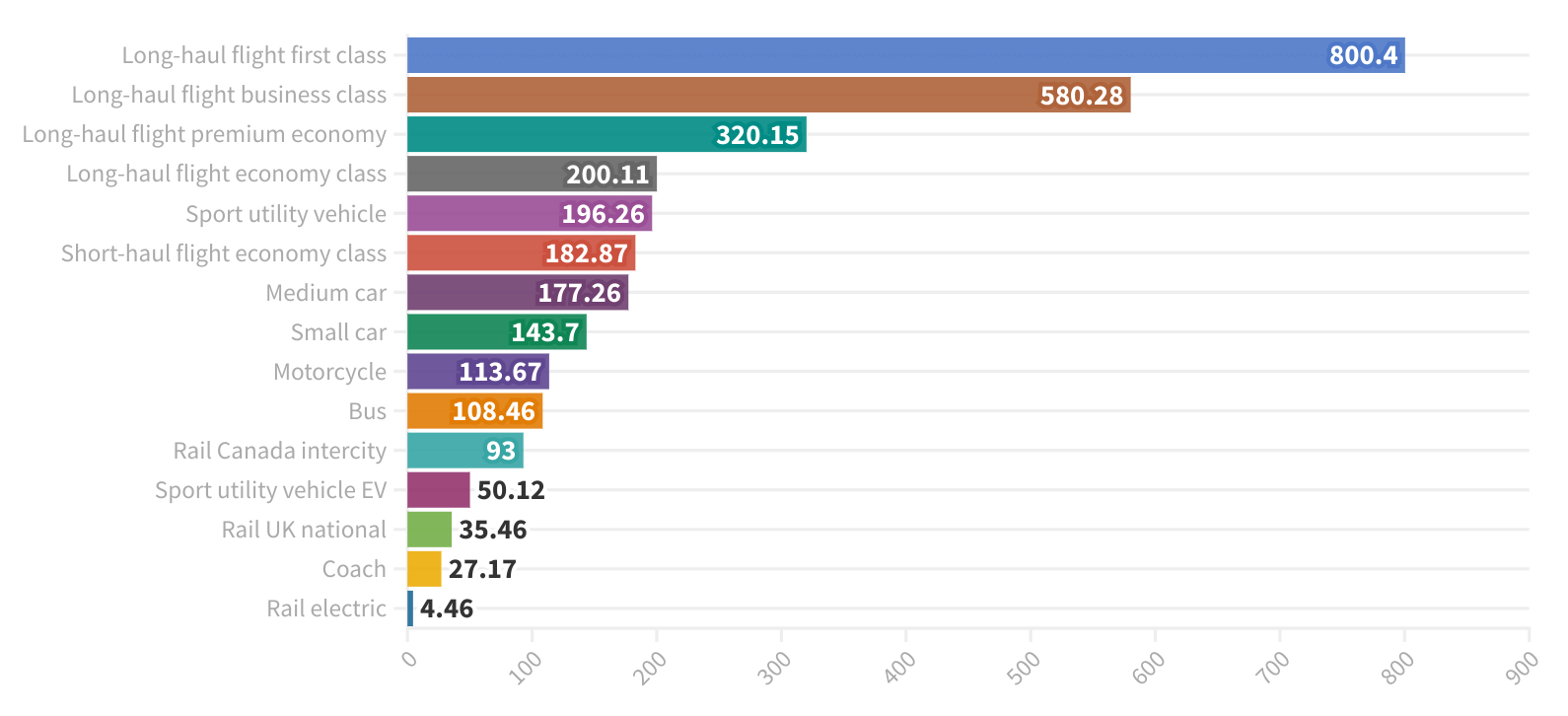Flights are currently not vegan certifiable
Vegan Society of Canada News
Published September 16th 2022
Updated January 15th 2025
For some time now, we have known the toll on the environment from the aviation industry. The emissions are significant as only one transatlantic flight or two medium-distance flights is roughly equal to all the emissions saved from one person switching to eating foods suitable for vegans for an entire year.
While aviation is a considerable polluter, it is not due to the roughly 80% of the planet’s population who make less than $10 US per day. Even among wealthy countries, those who fly are the minority: a recent Gallup poll shows it is consistently at around 40%. In addition, even among those who fly, it is that minority of frequent flyers who are responsible for the majority of the pollution.
The emissions from different modes of transportation are dependent on variables, and while flying is often portrayed as the worst, in some cases, alternatives can be more polluting. It would be foolish to think every sector of transportation is having the benefit of technological advancement while the aviation sector is at a standstill.
As previously discussed, there isn’t an international consensus on how to derive various emission numbers; governments have an incentive to deceive if not outright lie to the public and we have seen that happen in Canada. However, we find the numbers published in the UK to be at least more comprehensive than those in Canada. For example, their greenhouse gas conversion factors include radiative forcing and the effect on emissions of average flight occupancy.
The graph below shows the impact of various factors—such as rail fuel usage or travelling in business class—on the resulting emissions.

As we can see from this graph, the occupancy of the chosen mode of transportation is an important factor. For example, one of the differences in the calculation for buses vs coaches is the occupancy factor as coaches tend to run with a higher occupancy rate, at least in the UK where these numbers originate. The emissions of rails are subject to both occupancy rate and technology employed, as we can see in the comparison between the Canadian rail service which uses diesel locomotives, to UK national rail which uses both electric and diesel, and Eurostar which is fully electric.
The emissions of commercial flights are comparable throughout the world because there are few airplane manufacturers; while occupancy rates differ depending on days and route, the nature of for-profit businesses means on average it will be fairly consistent.
The efficiency of electric vehicles depends largely on the underlying electric grid that supports them. In Canada, it would be different from province to province, but emissions would be lower than in the UK since on average our electricity includes more renewable energy due to the significant amount of hydropower in Canada compared to other countries.
This information should help us put all of these modes of transportation and factors into perspective. It is likely that, similar to Canada, these numbers have various issues, such as vehicle accessories not being taken into consideration, but the big picture should remain valid.
It’s obvious that not travelling is always better and that flying in general tends to have higher emissions than driving, but that is not always the case. Flying economy class and owning a non-electric SUV, common in North America, means that the flight is likely to have a lower carbon footprint.
It’s important to note that if we had perfect knowledge, could account for all animal exploitation and assign each individual a score based on the amount of animal exploitation they are directly or indirectly responsible for, we posit that a majority of people who self-identify as vegan in G-20 countries would account for more animal exploitation than some people who do not self-identify as vegan from non-G-20 countries. This should cause us to deeply reflect on our vision, veganism, and our actions.
New developments in the aviation industry might make changing our behaviour easier. Most if not all flights are likely not vegan-certifiable. We posit that somewhere in the flying process there is bound to be something that would prevent vegan certification, for example, standard aviation fuel with its many additives is bound to either directly have or use as a processing aid some animal by-products. Nevertheless, in the years since our original publication, this has become much clearer due to the use of sustainable aviation fuel (SAF) made in part from animal fats.
SAF, in its most popular commercial form of HEFA-SPK, is made with a blend of plant and animal fats. Things have changed immensely since our first article, from five airports in 2019 we now have about 145 airports with SAF distribution. It is now predicted that SAF will account for about 0.53% of total aviation fuel consumption.
Canada is not immune since Air Canada signed a 78 million litre agreement for SAF in November 2024. Globally there are various incentives to increase this number rapidly to reduce emissions. There are already many airlines that are increasing their contractual volume of SAF purchases, as well as many countries with laws mandating the use of SAF, some with ambitious targets like the EU which targets 70% of SAF by 2050.
Globally, there’s currently a green taxonomy debate. In the Vegan World Alliance (VWA), there is a disagreement on the importance of having clear definitions of various subjects within veganism. We believe it is crucial since it is illogical to pursue a vegan world if we cannot agree on what vegan is. We hope one day our colleagues will come to understand the importance of having a common understanding of various concepts within veganism; thankfully, the European Parliament partly understands this and is in the process of defining various words and concepts to be used on the European continent with regards to sustainability. It’s critical to have a consensus around the definition of green since most regulations aim to increase the use of sustainable or green alternatives.
When profit is the motivation behind our actions, things are likely to go awry. We have seen the perfect example of this recently in the European Parliament. In their process of trying to define what is and is not considered a green alternative, the European Parliament decided that natural gas and nuclear energy are now considered green. We hope this is not the beginning of a global trend of greenwashing. Just like the vegan label is now used to whitewash the exploitation of animals, sustainable alternatives are not immune to these pressures.
The European Union concluded that the egregious exploitation of animals in the form of palm oil does not deserve to be labelled green or sustainable. We have long banned palm oil from our vegan certification and agree with the EU Parliament on this issue, but many of our European colleagues still certify as vegan the exploitation of animals in the form of palm oil. We hope this time they will be inspired by their parliament and join us in banning palm oil from vegan certification. This will have the beneficial side effect of underscoring the fact that veganism is not against the molecular structure of things but the animal exploitation behind it. What is unethical about animal exploitation is not where it occurs in the manufacturing process or supply chain, or that it affects something that looks like a cow, but that it happens at all.
Unfortunately, the European Parliament also decided to consider animal fats as allowable in SAF, all but guaranteeing its increased usage, at least on the European continent. These came into effect in January 2024 with some important tweaks since we first published this article.
The crux of the difference is what constitutes a “sustainable” fuel. To better understand this we have to touch on the misguided effort with ethanol. In hindsight, there’s a large question mark on whether ethanol is a net energy gain when considering the entire life cycle. Combined with the food insecurity it creates, land use change, water usage, pesticides, fertilizers, lower energy content, less shelf stability, various mechanical issues, and that in certain cases may function as an indirect subsidy for the animal agriculture industry, means that, even if there were good intentions at the beginning, the result is at best highly debatable and at a worst a bad idea.
Fast forward to now and the EU to their credit, unlike Canada and the US, wanted to avoid at least some of those issues by categorizing what can be used as feedstock for “sustainable” fuels. We will focus on the use of animals in SAF, which can be further categorized into products that can be used for SAF without restrictions, those that can be used but are capped at a 3% maximum and those that cannot be used at all.
Let’s start with those that cannot be used under any circumstance: human animals and certain non-human animals like cats and dogs are off limits for “sustainable” fuel. The next category of animals that can be used but are limited to a maximum of 3% includes things like non-human animals directly killed for food, heads of poultry, animal by-products from products meant for consumption by human animals, certain sea animals meant to be killed for food, etc. The last category is animals that can be used without limit and includes fats from various diseased animals, foetuses, and animals who died before being killed for food, such as chicks dead in their shells.
We will spare you the analysis of these categorizations, but in a way, these rules are meant to avoid some of the issues we have seen with ethanol and they will likely prevent at least some of them.
Now if you were flying freely before, all of this may give you some cause for reflection. Climate change is a big problem and fossil fuels, whether burned for air or land travel, are a major source of emissions; since electric vehicles are gaining market share continuously, electric aircraft are just around the corner. Some electric air taxis used for intra-city flights are already in use but the larger commuter market with seating capacity of up to 100 is more complex.
There have been tremendous advances in battery technology and, as is not uncommon in a capitalist system, it is not the oligopolist incumbent that innovated; we have to thank the people of China, who are now technologically far ahead of the rest of the world in battery technology. Yet high energy batteries that are light enough to power planes in the 50- to 100-seat range are still eluding us; for reference, the largest pure electric plane close to commercial availability is a 9-seater.
Our position and advice for businesses are consistent and that is to always give the consumer as much information as possible so they can make an informed choice. We encourage airlines that will not be using SAF made from animals to inform customers. Let customers know what kind of plane and what kind of fuel their planes will be using and make it easy for people to choose what they want during the buying process.
It will become exceedingly difficult for people to assert whether or not their flight is using SAF made from animal fats. Flights using fossil fuels were likely already not vegan certifiable but SAF made from animals makes this 100% certain.
Due to the exploitation of animals in flying, we should have already refrained from it, but for some this additional information may prove to be a stronger motivation to avoid flying altogether, at least for those who self-identify as vegan.




